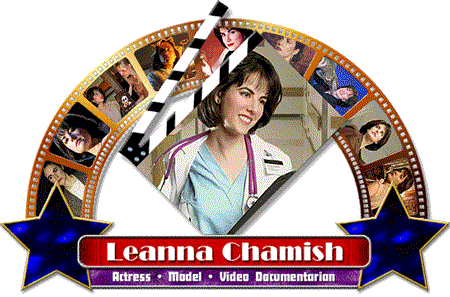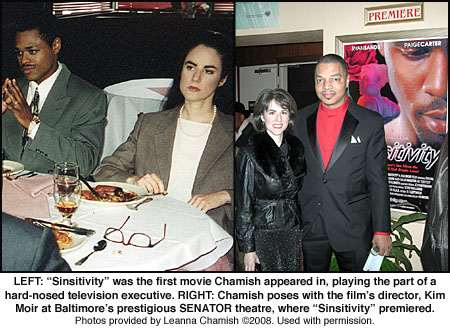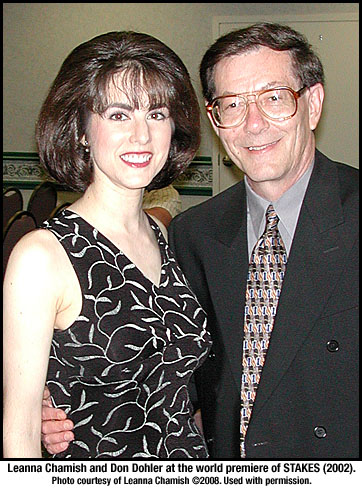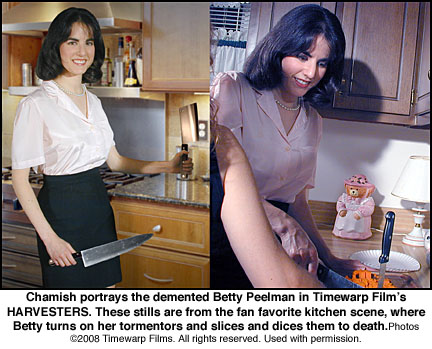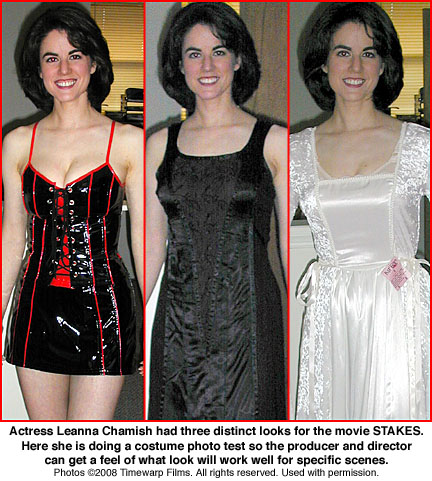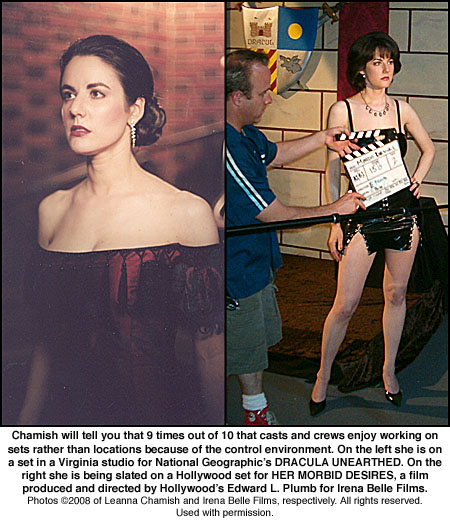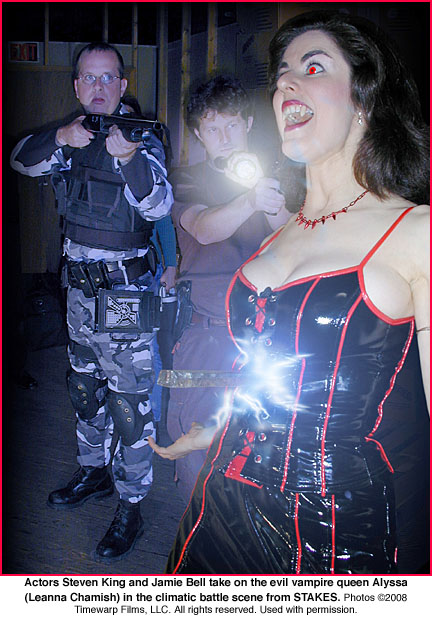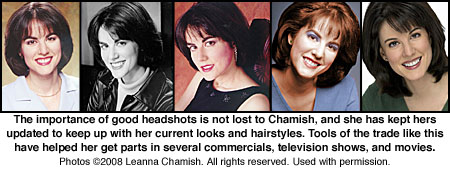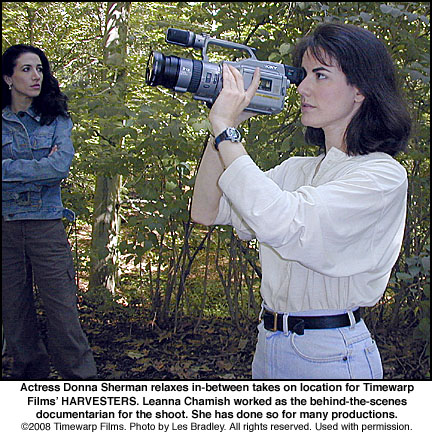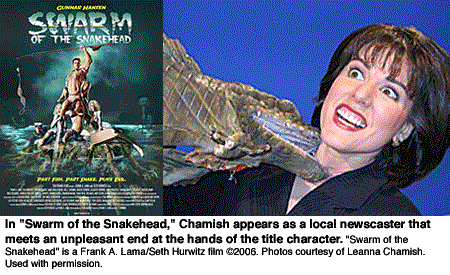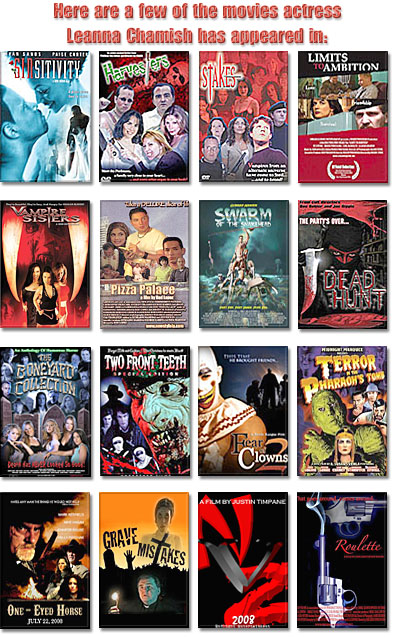Search
Part One of an In-depth Interview with
Actress/Scream Queen Leanna Chamish
by Robert Long II
Robert: Leanna, first off thank you so much for granting this interview. I realize what a busy person you are! I’d like to start off by asking how long have you been performing as an actress, and what got you involved with it? What was your first project?
Leanna: Well, I had always had an interest in being an actor, but it was thwarted throughout my childhood so I had pretty much given up on it until a few years ago. When I was a kid, I loved to read the books of plays my Mom had in the house from her college literature courses. I would read lines aloud and imagine performing. But the few times I ever got up the nerve to audition for school plays and such, I never won a role. I remember being in the chorus of “Annie Get Your Gun” at the Jewish Community Center, and I think I was a background flapper in “The Boyfriend” at summer camp, but that was pretty much it for stage work. So I figured I sucked at acting despite my daydreams and stopped pursuing it.
Fortunately, I had another outlet for performance of a sort, which was radio broadcasting. My Mom worked in radio and when I was a kid, I recall she asked me to say some lines in commercials when a kid’s voice was required for spot. So I think my earliest on-air work was when I was 5 or 6 and I may have said something like, “When is Santa coming?” Anyway, the radio station where Mom worked seemed like a really cool place. I was really impressed and I suppose I absorbed the idea you could make money with your voice, and it was fun! In high school, I was the person who got on the PA system in the morning and did the morning announcements and everyone would always remark that I had a good voice and I was destined for broadcasting. So when I went to college, I worked at the student radio station and after graduation worked at various radio stations in Baltimore and Annapolis, Maryland. I also picked up video production skills through volunteering at a cable station and through some weekend classes at a local college.
I began my on-camera career in 1999. I was a video editor at Maryland Public TV and my friend and colleague Kim Moir began making his film, “Sinsitivity”. When Kim had auditions for the film I tried out for the role of Jodi DiLeonelli and did not get it. I hadn’t auditioned for anything for a long time, so I figured I still didn’t have it and that was that. But I offered to help Kim out in any way I could and he scheduled me to be an extra for a newsroom scene featuring the character Jodi. Well, at that shoot, the woman who was to play Jodi never showed up! So Kim asked me to play the role and luckily I remembered the lines from the audition. Then they were stuck with me, so I got to play Jodi in other scenes and locations as well. So that’s how I got my big break into movies!
At the same time we were shooting “Sinsitivity”, one day a letter showed up at my house announcing that the public TV station where I worked was having a search for new on-air talent to be spokepeople on the pledge drives. I don’t know if everyone who worked at the station got that letter or what, but I am so glad I got one. I decided to go for it. So I dressed up and did my hair and make-up to the best of my ability at the time and did the audition. I guess through years of working at the station I had really internalized the style of asking for pledges and when I was there at the audition winging it for the camera I really came up with some good improvised appeals to the audience. So I got the job! Well, after they told me I got it, I thought to myself, “I have to do this right!” So I went and hired an image consultant—I got a new hairstyle, learned to do my hair, learned how to do my make-up for TV and got wardrobe tips.
My first on-air experiences as a spokesperson at Maryland Public TV were so successful and the feedback I was getting from the “Sinsitivity” movie folks was so positive that I figured other people might want to hire me to speak on camera or act. The Baltimore-Washington area has a lot of industrial video production because of the high concentration of government agencies and “Beltway Bandits”, you know, the large companies that have government contracts, such as aerospace and computer firms. So I figured I could make a lot of money by dressing up in a nice suit, looking sincerely at the camera and delivering a corporate message.
I signed up for an on-camera performance class taught in DC by a very successful actress, Brenna McDonough. I thought if she was out there really doing it and making money she’d be a really good teacher, and she was! I learned how to market myself and contact casting directors and agents, so the ball has been rolling since then — I’ve done lots of acting and spokesperson work on live TV, TV shows, videos, commercials and films. And I still use just my voice to do voice-overs for radio and TV and corporate/educational films. My other teachers in my area that have really helped me are Hillary Sachs, Sareva Racher, film director/teacher Steve Yeager and voice-over coach Liz Noone. I also had the opportunity to take a few classes from Dee Wallace Stone in Los Angeles, which were eye-opening and helpful.
But I’d say my film career really took off when I auditioned for Timewarp Films, a company co-founded by the well-known director Don Dohler, for their film “Harvesters”. But, interesting story, I never would have auditioned for them and met them if it wasn’t for a really amazing chance meeting I had with Count Gore de Vol. Count Gore’s real name is Dick Dyszel—he was a TV horror film host in Washington, DC and appeared in Don Dohler’s earlier films. Anyway, I was at the Balticon Science Fiction convention many year ago and I was really tired, so I was lying on a couch in a lobby of the hotel. Count Gore was on a staircase and yelled down, “Looks comfortable.” I yelled back, “It is! Join me!” He hesitated but then did this “what the heck” shrug and came down and laid down with me on the couch. He told me all about his career, including working in Don Dohler films. Later, in August, when I saw the casting notice for “Harvesters”, I remembered the Count Gore connection and called him up. I asked him to be totally honest with me and tell me if Don Dohler was a good person to work for. Count Gore said absolutely yes, Don was wonderful to work for! So I auditioned for Harvesters! And the Count was right. Don Dohler, may he rest in peace, was a prince, very sweet and talented and fair. By the way, Count Gore and I became great friends and have worked together as a team at sci-fi and horror conventions. I also am his videographer for some of the interviews he features on his website, www.countgore.com.
Robert: Now as an actress, how do you go about preparing for a role?
Leanna: The most important thing in preparing for a role is to get the lines down cold as soon as possible. I try to read the script and practice it a little every day, even if the shoot is a month or more in the future. This will make it easy for you on the set and the director and crew will love you for not wasting their time with unnecessary retakes. But another important reason to learn the lines cold ASAP is that once you are very familiar with the words you begin to either understand why the writer wrote them that way or you will come up with your own ideas of why your character would say those words. A line that may have seemed isolated, illogical or unmotivated to you before will develop a reason for being, which will enrich your performance of the line and also help you remember your lines once you have internalized the motivation to say them that you developed. Also, once you have memorized the script and that pressure is off you, you are free to explore and develop the character. Plus, I find that on set the words will tumble out of my mouth even if I do not consciously think I remember them. It becomes a muscle memory, I’m sort of on auto-pilot, verbally.
The other aspect of preparation is doing some learning about your character by doing research or thinking about your character if it is something you can’t research. For example, for “Vampire Sisters” I asked director Joe Ripple, who was a police officer at the time, what it is like to be a cop so I could have a realistic attitude – he said cops are often low-key and businesslike because they’ve seen it all, so I took that to heart. Now for “Stakes”, I didn’t have any vampire queens to ask about their lives and how they behave, so I had to make up her personality from scratch – I decided she was confident, took her victories for granted and was like a dictator, so I held those thoughts in mind during the filming.
Robert: Does the director or screenwriter supply you with a back story for your characters?
Leanna: No, not always, though it is very helpful if they do, if it is not apparent from the screenplay. My favorite example of this is my character Betty Peelman from “Harvesters.” You don’t know anything about her background from the screenplay or the film. But in pre-production, Joe Ripple told me that Betty had been sentenced to a mental institution because she really enjoyed viciously murdering people by chopping them up, that she just loved to mince people into tiny bits. Joe said Herbert, my husband in the film, killed his first wife to sell her organs on the black market and then, realizing he wanted a new wife who wouldn’t get freaked out by the “family business”, kidnapped me from the mental institution. But Joe said Herbert would not let me, Betty, participate in the organ harvesting because I would shred up the bodies too much. So, keeping all that in mind when performing as Betty really helped. That background explains why Betty thinks nothing of confronting the armed gang that invades her house, which would be considered an insane thing to do by most people. Best of all, the backstory I had in my mind from Joe explains the gleeful grin on my face as I slash Spikes’ throat in the kitchen. People always comment on that facial expression when they see “Harvesters”, it really makes an impression. I was in character as Betty and my thought as I slashed her throat was along the lines of, “Yay! I finally get to kill again! It’s been so long!” And as Spikes is dying I think I was thinking, “Oh, silly stupid girl, did you think you could scare me? So there!” So, to generalize, I’d say knowing a backstory, whether it is supplied to you or you make it up, is important and will absolutely inform your performance in a positive way by giving you some bearings and consistency and make your performance unique.
Robert: Have you ever gone into a role feeling unprepared?
Leanna: That depends what you mean by unprepared. Do I ever show up not knowing my lines? No! I am always prepared in that regard. Do I ever show up not having researched or thought about my character? Nope, I always do that. But… I’ll often show up not knowing exactly how I am going to say some lines or how my character is going to interact with the other characters. You usually don’t get rehearsals in film work, commercial work and industrial work, so I often have no idea who I will be working with, what the set looks like or what kind of action the director might have us do as we speak. So, I need to be free to respond to the environment and the other personalities. I don’t want to lock into an interpretation of my lines, although trying different ones on for size at home is not a bad idea and it is a good acting exercise, too. Besides, if I had my heart set on an interpretation but it just didn’t work with the other actors or the director directed me to do it another way, I’d be screwed. So, I know the lines and let myself play with them or find a good way to say them on set. It feels “unprepared,” but it really isn’t.
Robert: Leanna, you have gone to auditions for various different acting gigs. How do you prepare for it?
Leanna: It depends. Some acting jobs will give you a script, or what they call “sides”, which are pages excerpted from the script, prior to the audition. If I am in that situation, I will, of course, practice the script as preparation. I’ll also run the lines in the car on the drive to the audition.
Then, some auditions are run as “cold reads”. That means you just show up and there are script pages on the table at the sign in. Either you know the character they want you to audition for and you take that script, or if you have a choice of which character or characters you want to audition for, you can decide which script to pick up based on the character description. You have a few minutes to read the script over before you are called in to audition. While waiting to be called in, I usually find a corner or wall to face into and I run the lines, usually quietly if there are other people around.
Whether I get sides in advance or the audition is a cold read, there are mental preparations I can do. I’ve probably read a description of the film and a character breakdown that interested me in auditioning in the first place. From the description of the film and what you can find out about the filmmakers, you can visualize what the film’s style would be and get in the mood for that. From the character breakdown, you can learn enough to develop somewhat of a character for yourself and also understand who you are talking to in the script, which is essential for delivering lines well, since you’d talk differently, probably, to an elderly woman than to a teen—if you read the breakdown, you’d know you were talking to a sick, old lady, for example.
Robert: What do you bring with you?
Leanna: I always carry a digital voice recorder to help me learn my lines. I keep bottled water, Cliff bars and those packages of pre-made tuna salad and crackers in the car. Keeping hydrated is important for the voice, plus I always have a snack if my tummy is rumbling audibly and a meal if things are running long. I also have a suitcase full of headshots and resumes, comp cards, video demos and audio demos. I have staplers, staples, double-sided tape, pens, highlighter pens and envelopes. Sometimes I take my laptop with videos and audio files on it, or I’ll at least carry a USB flash drive with my marketing materials in digital form on them. I may not take all these things into the audition with me, but at least I have them nearby and could throw together a package quickly if asked or copy images or media files to their PC. Also, it is not unusually for other actors I run into while auditioning to say, “Hey, you’d be good for something I’m in now!” Since I have lots of photos, etc, with me, I can give them a headshot or whatever in the parking lot afterwards, that they will pass on to whoever they are working with.
I also almost always carry a change of clothes that would be appropriate for the audition, in case I accidentally ruin my outfit somehow, even though I often drive to auditions wearing a robe over myself to protect the clothes. I also carry a comfy change of clothes so I can relax after the audition.
Robert: How do you dress for it?
Leanna: I always dress how I think the character I am auditioning for would dress. If I plan to audition for more than one character, I try to find a middle ground or a neutral casual look that will let the casting directors visualize me in many ways. But generally, I know which character I want to be, and dress that way. If I am going for a suburban Mom, I’ll wear khaki pants and a sweater and flat loafer shoes. If I am going for a newscaster, I’ll wear a suit with dress shoes. If the character is a hitwoman, tight black leather pants, boots and jacket. That type of thing. Of course, if I get a callback, I wear the exact same thing I wore the first time! That’s a well-known rule in the acting world.
Robert: In your opinion, are most auditions standard, or are they unique in their own way?
Leanna: Most auditions are standard. You walk in and there is some sort of sign in sheet. You are given or find the sides for the character you want to be. You wait around and study the sides. You get called in to a room where some people are sitting at a table and someone has a video camera on a tripod with a monitor hooked up. You hand your headshot to the folks at the table, say hello and stuff, then they tell you where to stand. They may tell you which of the people at the table will read the lines of the other characters as you perform, but those people remain at the table and do not perform in front of the camera with you. They may give you some brief directions, like, “Imagine the spaceship is on fire over there,” or “we’re looking for a lot of anger here, she’s really pissed.” They’ll usually tell you to slate the audition when they start the camera, which means saying your name and the character you are auditioning for, maybe adding your agency information or phone number if they want it. So, they start the camera, you say your name and the character while looking right into the lens with a nice smile. Then you look away from the camera like you are talking to the other characters or looking at the spaceship or whatever, take a few beats, get your face and body into character and do the scene, usually reading with the guy or gal at the table who usually reads the other lines in a monotone voice so as not to influence your performance. Of course, if this is the kind of acting job where you are supposed to look right into the camera, like a newscaster, you will do it that way. Then they turn off the camera, say goodbye and that’s it!
There are variations, of course. Sometimes two or more actors will be called in to audition together to see how they look together. Occasionally, you will be asked to do a monologue in addition to the script. Of course, you as the actor have to have monologues prepared for this occasion- you are not supplied with one! But, truly, I rarely get asked for a monologue. Some auditioners want to tape you talking about yourself or will ask you a personal question about the saddest thing that ever happened to you or something weird like that. Then there are auditions that require a special skill or need the filmmakers have – like for “Harvesters”, Timewarp wanted a woman who could give a blood-curdling scream! I screamed my lungs out on their cue for the audition, and it was very funny to be in the waiting room and hearing the screams come out from the other actresses!
Robert: How is costuming handled on a project? Is it “everybody wear what you want to wear” or are the costumes actually cleaned and put back on the rack at the end of the day? Does the cast supply their own costuming, is it supplied to them, or do you have a wardrobe allowance for them?
Leanna: In almost every project I’ve done, from film to commercials to industrials, everyone brings their own clothes and is responsible for their care and cleaning and transport back and forth to set. It is “wear what you want to wear” to some degree, but you are given guidelines by the director and are expected to show up at set with a suitcase or wardrobe bag with at least 3 good options of outfits fitting the general description. The production company’s stylist may supply any unusual or specialized items for you, but be sure you have communicated in advance and are certain of the responsibilities.
A suggestion I have for people who are going out to buy clothes for a role is to buy duplicates, if they can. This is mostly important for films where you will get dirty, like horror films. Go to a bargain store and get two identical pink shirts, or whatever. Jeans and pants are not so critical, because you can change jeans and people might not notice, but they probably will notice if the shirt is different!
I keep a “wardrobe room” at my house and keep it stocked with clothes for the usual kinds of characters I am asked to play. I will buy clothes on sale at Wal-Mart or Target, so I can have a whole rack in a variety of colors of Mom sweaters, business casual pants, blouses, pants suits, skirt suits etc. I also have shoes of all types. I never wear these clothes except on jobs or auditions. I do not want them to get dirty. It took me a while to collect all these clothes, but now I am ready for almost any job or audition without having to make a run to a store in a hurry.
Also, this is sort of related, I would encourage all actors to take responsibility to remember what they were wearing in scenes so they can wear the same thing on a subsequent date, if it is part of the same scene or ties in some way, such as it is one hour later and the character had been in the car with no opportunity to change. Take pictures of yourself, write on your script what you wore. Low budget films to not always keep good track of this, and the director and editor will love you for handling this and not screwing them up later.
The only time I have ever had any assistance with choosing and purchasing costumes was on the film “Stakes”. Director Joe Ripple wanted to be sure my character of the Vampire Queen was eye catching, so he took me to the Hot Topic store at the local mall and we picked out three outfits, the vinyl mini-skirt and bustier combo, the black gown and the white gown. Going shopping for those outfits was an interesting experience. Joe and I are a little older, ahem, than the usual clientele at that store. So the kids there are seeing him bossing me around as to what sexy outfits to try on. I’d come out of the dressing room in some skimpy thing and he’d have me turn around and say yes or no in a very brief and businesslike way and of course I’d just go along with whatever he said. I wonder if those kids thought we were kinky grownups into some master/slave thing!
Robert: If you have worked both within sets and locations, what are the pros and cons of both?
Leanna: Working on a real set is very nice, because everything you need is there, such as power and lights and it has been thought out as to what it should look like. One of the nicest experiences I have had with working on real sets was when I was in “The New Detectives” which airs on the Discovery Channel. It filmed at New Dominion Pictures — they have a soundstage and back-lot of streets and fake shops, etc, that can be anything you want. Inside the soundstage we could go from room to room for scenes, with no travel, power or lighting hassles. It was like, here, do the dining room scene, here do the bedroom scene, here do the coroner’s office scene… then out to the back-lot where quickly we were able to knock out a scene in a clothing store, a scene in a convenience store and a scene in the parking lot because it was all there. I can’t really say working on a set has any cons.
But, usually, the things I am in are shot on locations, indoors and outdoors. As far as outdoors locations go, I enjoy being outdoors unless it is too cold, since I have a circulatory problem with cold and I can get frostbite very quickly even in temperatures that don’t bother other people. Outdoors presents some problems, such as lack of power outlets! Most people I work with don’t have a generator, sometimes because they can’t afford it, or sometimes because they don’t want to deal with the noise, and the quiet ones cost so much more! Also, it would be hard to get a generator to the wooded locations, for example. For “Harvesters” we hiked a few miles into the woods on a narrow, bumpy path to get to where we shot the foot chases– it would have been hard to get a generator to that spot.
Hmmm… other problems with shooting outdoors on location would be sometimes there is not someplace to sit if it is muddy out. And bugs! You can get bitten up by bugs and walk through spider webs. And you have to make sure you have your permissions to use the property and you need to warn authorities about if you are going to use guns or stage a fight. In “Stakes” we had a situation where a cop drove by, saw our actors with guns and started to call for backup! Fortunately, Joe Ripple was able to prove we had permission. Incidentally, drop your movie weapons if you see a real cop who thinks you are really armed! Sort it out later!
For indoor locations, the main drawback is that the spaces are cramped, there may not be enough electrical power and it is decorated the way the property’s owner likes and you may not be able to change that. For an example of cramped, oh my gosh, the scene in “Harvesters” where Steven King sticks the knife into Joe Ripple’s eye– we shot that in a donated basement location in someone’s house. God bless ’em for saying we could shoot there, but it was so cramped and full of junk we could hardly move. As far as a case of being stuck with some décor, people keep asking me why the police station in “Vampire Sisters” has fancy curtains. Well, Don Dohler’s lawyer let us use his office as the detective desk area, and that’s what he had! Of course, many times we’ve blown someone’s fuses while shooting in their home by plugging too many things in. Those are the disadvantages of shooting on location indoors! But at least there is usually a toilet!
Robert: You’re on the set, miles from civilization, and “nature calls”. In your experience, has your production team taken necessary measures to have proper facilities available, or do you have production horror stories of poor planning?
Leanna: Well, I can’t really say it was poor planning. Everyone knows there is not going to be a toilet in the woods and we just deal with it. I remember on “Harvesters” I brought toilet paper into the woods the first time we went out there. People laughed at me– until they wanted some! So I always take toilet paper out with me. No independent film I’ve worked with could afford a Porta-Potty or anything like that. So, if you have to go, you have to wander off into the woods to a private spot and do your thing. But, surprisingly, I’ve held it for long periods of time outdoors without really trying. The shoot itself is an enormous distraction and I think being outdoors dehydrates you.
Robert: What kind of food prep or catering is usually available to you on an independent production? Does it vary greatly from company to company?
Leanna: It varies greatly from company to company. “Sinsitivity” had wonderful food – Deborah Moir would make us shrimp gumbo, salads and other terrific dishes and bring it to set, like the real nudie bar we shot at, and set up warming dishes, etc. Timewarp has never let me starve on set! They tend to order pizzas or get buckets of fried chicken. Recently for the film “Pizza Palace” they usually had sandwiches available. Some productions may provide chips, cookies and soda instead of meals. On my day on “Fear of Clowns 2”, they were using a restaurant as the actors holding area, and told me to order whatever I wanted on their dime. Other folks may give you time to go to a restaurant.
Of course, the big budget films always have snacks for the cast, a constant supply of chips and soda and coffee and cookies, etc., at a table you can go up to anytime. Plus there are nice meals served at proper intervals.
But even on low budget independent films, I’d have to say there’s always something around to eat. After all, the crew and director get hungry! But just to be on the safe side, I always have snacks in my bag, like the Cliff bars and tuna fish packs. This comes in handy if I am just really, really hungry before anything gets delivered.
Robert: While they may have employed special effects artists and make-up artists in productions you have worked on, has the various production companies ever used a make-up artist for the glamour of the actors and actresses, or is that up to the individual performer to do?
Leanna: Yes, some of the low budget films supply “beauty” make-up artists on set, but most productions expect you to do your own make-up for a regular or glamour look. I’ll tell you, even in the cases where a make-up artist is supplied, I end up doing my own make-up, for a variety of reasons. The make-up artist may be a volunteer and not be there all the time, and I want my look to be consistent. Or the make-up artist may be overwhelmed by the amount of people she is expected to make-up in a short time, so I can save the production time by doing my own. Also, I’ve noticed lighting can be poor on locations, so I’ll just do my make-up at home or elsewhere and show up ready except for slipping into costume. I like this, actually, because I can relax when I show up and eat and schmooze, instead of locking myself in, usually, a poorly lit, dirty bathroom someplace! But on the rare occasions when there is a good make-up artist consistently on set, it is very nice — I usually learn some tips from them and it just makes me feel like a star, letting someone else fuss over me!
Robert: Have you ever had to do stage fighting or stunts in any of your features?
How do you prepare for that? Have you ever been hurt?
Leanna: I think the only time I’ve ever done stage fighting was in “Stakes”, when I, as the Vampire Queen, get to knock around George Stover, Jamie Bell and Erin Corsair. Joe Ripple choreographed that fight down to every move, as he does for all fight scenes in Timewarp Films movies, as you’ll see if you watch the behind-the-scenes documentary I made for the DVD of “Dead Hunt”. In “Stakes”, when it appears that I am hitting George and Jamie, I am really missing them and swinging past them – the camera angles and sound effects make you think there was impact. When I was strangling Erin, it appeared I was holding her up off the ground and squeezing, but really she was standing on a milk crate or something so there was no actual pressure on her neck.
Anyway, I prepared for that fight scene just by being in good shape and focusing on what Joe Ripple told me to do. I studied martial arts for 10 years straight once, so I was not afraid of anything physical. There really was no preparation other than what I’d do normally – I thought about how angry the Queen would be at that point, got into character and did what I was told!
When I killed Micci Sampery’s character, Spikes, in “Harvesters”, I guess that counts for a fight scene. That was also directed by Joe Ripple and he makes safety the priority. So even though I was swinging knives and cleavers, we always had the camera angle such that it looked like I was close to her but I was not. And there was a fake hand involved in that scene, when I plunge the knife into her on the cutting board.
So, I’ve never been hurt. Interestingly, the only time I ever felt really in danger was on a project for a major TV network, which I do not want to name. But they had me stand on a rocky cliff overlooking a waterfall. There were warnings posted all around that if you fell you would die and that people should not go out on the rocks. Looking back on it, I should not have let them convince me to do it. I was so eager to please. I am glad the shoot went well, but I will be more assertive about that type of thing in the future. This is one of the drawbacks of being non-union – there was no one looking out for my safety and no one to complain to.
Robert: Have you had any formal training in acting or improvisation?
What do you suggest a person does to prepare for acting for independent genre films, or just acting in general?
Leanna: I have had a little bit of training and the classes do cover scene study as well as improvisation. I’ve studied with film/stage director Steve Yeager and film/stage director Mark Redfield. I studied improvisation with Gary Austin, founder of the famous Groundlings group, from which many TV, movie and comedy stars have emerged. Not to exaggerate or namedrop, but I have taken a few classes from Dee Wallace Stone at her studio in LA, which was very interesting. I would like to go back to her studio when time permits, but now when I visit LA I might take a seminar at the Actorsite, which fits into my ever shifting schedule a little easier. My most influential teacher to date is Hillary Sachs, a former Warner Brothers casting director who moved back home to Baltimore a few years ago. I feel she has the LA standards and brings her students up to that standard. For voice-overs, I studied privately with Liz Noone.
If a person wants to prepare for any acting in any film or TV genre, it is extremely important to get training, even if you are a natural. The comfort level you will get from classes will help you not get nervous at auditions or jobs. Improv will make you realize you can deal with uncertainty and come through, so then scripted stuff seems like a breeze. You learn to work with and listen to your fellow performers. Through classes you will learn techniques and thought processes that will carry you through a new challenge. You can get the opinion of the teacher and students about your performances. At classes you will meet teachers and fellow students who can recommend you for jobs! Take classes!
You hear a lot that casting directors are looking for people with theatre experience. It is true to some degree. But I do not like stage performance and my film and TV career is doing okay. I realize my headshot probably gets trashed at a lot of casting offices because I have no theatre credits, but I am not going to let that bother me. I think I am on my own path and will develop well anyway. But if anyone considering a film acting career has the time and inclination, some stage credits are beneficial.
Robert: Do you have an agent? If so, how did you go about getting one?
Leanna: Yes, actually I have several non-exclusive agents, but it is not necessary to have an agent in my immediate market of Baltimore/Washington/Virginia/Pennsylvania. It is, however, pretty much necessary to have an agent to seek work in New York and LA. I still find most of my jobs on my own but I am glad to have the agents for if I need help negotiating a contract. The best way to get work in this area, meaning Baltimore/Washington/Virginia/Pennsylvania, is for an actor to attend open calls at casting director offices—once you’ve auditioned and get your pictures in their files, they will consider you for work when then get a call for your type. A lot of actors starting out may not understand the distinction between casting directors and agents, and since casting directors often call themselves the such-and-such agency, it adds to the confusion. An agent will work on your behalf and submit you for projects. A casting director will keep you in their files and call you if you fit a need that they are told about by a client who has hired them to cast something—they will also accept submissions of headshots from agents for a job. Think of it this way – an agent works for you, a casting director works for the production company that hires them to cast something. So, though I could get away with only keeping my pictures on file with the casting directors, I have agents as well.
I got my agents and my casting director contacts by surfing the web for agents and casting directors in my area and also by asking people about their experiences with people and companies. I applied to people who were recommended. Some agents and casting directors do not want to take phone calls and want you to send them a package in the mail as an initial contact. Some accept calls. Anyway, I had good luck when I got appointments with folks. They accepted me right away because of my strong demo reel and previous experience.
I would recommend to any actors seeking an agent that they should avoid signing any contract with an agent that gives the agent a share of profit from work they did not help you get. Also avoid managers who try to grab money they didn’t help you get.
Robert: What are the advantages and disadvantages of being a Union or non-union actor?
Leanna: At the moment, I feel it is best for me to remain non-union. I think I can get more work as non-union talent. I have heard from people who join union that suddenly they aren’t working because they can’t participate in the kinds of projects they used to, like independent films. If I were in the union, I could not act in a Timewarp Films movie! That would be really depressing! I’d go “financial core”, which is a union status in which you give up voting rights and such for the ability to do non-union gigs as well, but the union people in Baltimore and Washington get very angry at financial core people — they view them as scabs stealing money from them. I don’t feel like facing that attitude.
I understand the protections on set and the contractual protections union offers, as well enforcing payment and having a good minimum payment for jobs, but at this point in my career, I’d rather accept a lot of perhaps lower paying non-union jobs and rake in that money and get exposure and experience. Luckily, even as a non-union person, my agents get me nice rates and make sure I get paid.
Robert: Do you feel you are a leading role person or more of a character actor?
What age range do you state you can perform within?
Leanna: I am currently stating my age range as 25-40. I see myself as more of a character actor. I am very lucky that I have had the chance to play lead roles in the horror films, but they are strange personalities not found in the mainstream movies. I strongly feel I have the ability to play conventional characters as a lead, but I think in non-horror genre films I’d more likely get cast as the sidekick to a romantic lead or some other supporting role, such as when I played the mother in “Pizza Palace”. That does not bother me! I just love working. I know casting directors sometimes get a chance to make bold and unusual choices in casting and maybe I’ll be in the right place at the right time to get a lead role as a regular woman, not a vampire or slasher!
Robert: What kind of roles, on average, have you been getting? Are there any kind of roles you wish you were getting? Are there any type of roles you will refuse to do?
Leanna: If you include all types of work such as commercials and industrials, I’d say I am getting a lot of mother and career woman roles. I can’t really say I have a strong desire for any particular type of role, though as I think about it, a role as a detective would be very nice. I liked playing Jennifer Hunt, the vice detective, in “Vampire Sisters”. Maybe I could be in one of those crime dramas on TV which have a lot of smart, capable female characters getting into conflict, danger and romance. Could be fun!
I would stay away from roles that are in films or programs whose agenda I disagree with. I am willing to play an unsympathetic character, but only if the message of the film is overall something I agree with or find entertaining. But, as I said, if I find the agenda of the film disturbing, I won’t participate. For example, let’s say, if a film tried to make a hero out of a racist and promoted racism, I wouldn’t get near it.
Robert: How much importance do you put on proper diet, physical fitness, stimulating mental activity, and getting enough sleep? Do you find this a necessity for staying primed as a performer?
Leanna: I put a lot of emphasis on all those things — they are necessary for me as a performer and I’d recommend it for any other performer. Getting enough sleep is important because sleep is how the mind integrates new experiences and sleep helps with the ability to memorize. As far as the physical fitness goes, I want to feel good and have lots of stamina not only for my performances but also for the work that goes into getting to the performance, such as self marketing, classes, networking and auditioning. I am not on any particular diet, but I just make sure not to over-indulge. Generally, I stay away from cakes and sweets and soft-drinks, which seem to be useless calories. But of course I have them sometimes. I think exercise is the real key to staying in shape and keeping your energy up and your stress down. I go to a gym at least three times a week. I use the treadmill and the elliptical walking machine to get a cardio workout and burn a lot of calories. Then I use variety of weight machines to tone the arm, back, ab and leg muscles. I need to stay in shape in case Timewarp films wants me to wear another skimpy outfit in a film!
Stimulating your mind is just as important. I like meeting new people, trying new activities and watching challenging TV programs like documentaries. The more you expand your horizons, learn about the world and different types of people, the more you can call on from your brain when you attack an acting role. Plus, I don’t want to become a boring person who is just about seeking work and performing. That would make me a very uninteresting and overly desperate seeming actor. Looking desperate is the kiss of death, according to many casting directors.
Robert: What other skills do you have that you feel is important as a performer?
Leanna: I think I have good listening and visualization skills. Being a good listener helps with taking direction and understanding what the director wants. It also helps with responding appropriately to your fellow actors in the scene. I think I have good visualization skills, probably from my experience as a video editor, and I am able to think about what the scene will look liked filmed and edited. It makes me aware of my actions, how I am facing the camera and other helpful technicalities.
Robert: Do you think a person should have many different skills, experiences and such to draw from?
Leanna: Yes, like I was saying in the previous answer about stimulating your mind. If you’ve “been there done that” you may be able to recreate realistic reactions for the camera. Of course, for each role you will be using your imagination and if you are in the moment you’ll be feeling as your character. However, if you are a person who engages the world, and you’ve had your heart broken or you’ve really felt joy or loss and have been mixing it up among all kinds of people, your portrayals can’t help but have more depth. It’s in you.
Robert: To remain competitive, do you keep your head shot updated? Do you have business cards and promo slicks of yourself as your various characters? Do you have a website?
Leanna: Yes to all. I get new headshots done every 2 years or sooner if I change my hair style. For the areas I work in, it is good to have a casual shot and a business look shot, since I do want the work in the corporate videos and television spokesperson roles. My business cards have a picture of me on them—just another way to hopefully get work, when someone happens across that business card and says, “There’s the lady to play the nurse!” I swear, a producer booked me recently because he came across my card I had given him on a previous shoot and it occurred to him to cast me in his current project!
I have posters I have made of myself as various characters that I will send out in targeted mailings to the people I think the posters will appeal to. I hear the posters are up on the board at many casting directors’ offices. Friends who go for auditions report that to me. I love that casting directors are seeing me on their bulletin boards every day! For general use, I have a “comp card”, which is short for composite card, I think, which shows me in various types of clothing with different attitudes – that’s to seek modeling work for ads, still picture work. My comp card has me in doctor clothes, in soccer mom clothes, in a dressy suit and in trendy jeans and jacket– then my headshot is on the reverse side. The comp card has come in handy in seeking film and video work as well, even though the general rule is to not show the comp card to film directors, since there is a perception that models can’t act. You have to sort of feel that out, if you think the director will hold the fact you have a comp card against you. I feel that if the audition is strong, it won’t matter, but that’s my perception and I am not sure it is true. But if I am auditioning to play a doctor, I take the comp card so they can see what I look like in a lab coat.
Yes, I have a website and that is sooooooo important. My headshots and demo reels are up to there to see and hear. I love being able to point people at that if they are showing interest. It increases people’s perception of me as a professional. It’s great that if I am on location or traveling and I get a call asking me to send a headshot or demo, I can say tell the person to print the headshot and download the demo from the website. It saves me money, too, if directors can make a decision if they are interested in me or not from the website, instead of me mailing things out. The website is a fun way to brag about my achievements, too! I do my own website, since I know HTML and graphics. I bought server space from Yahoo and it is not expensive—it is an important investment, anyway.
It is a good idea to participate in some national casting websites such as actorsaccess.com, which allow you to submit yourself for jobs all over the country. Actors Access is my current favorite. It is free to join. They send you e-mail notices when jobs for your age range/gender are posted. Also, it provides a way for agents or casting directors to text message you. You get to see the character breakdowns and if you want to apply, you can click the character name, and for just $2 charged to your credit card your headshot and resume get electronically submitted to the casting people.
I also participate in a few national casting systems that are used by some agencies. I have my headshots and info on Agency Pro and also Supermodel. It costs money, but they have paid for themselves many times over. Participating in those makes it easy for casting directors on the system to pull me up in searches for talent and to submit me for consideration to their clients.
Another important actor tool you didn’t ask about is postcards. I mail out custom designed picture postcards on a quarterly basis to all my showbiz contacts to keep them updated on my career. I’ll also send thank you postcards with my picture after an audition or to let people know of upcoming TV appearances, film premieres, etc.
And don’t forget about video demo reels! Mine is a little over 3 minutes long, which I have been told is a good length and has clips of me from a wide variety of projects. The trend these days is to make really short demos of about one minute, so you might want to consider that. I put mine on DVDs. I can also make VHS tapes, but most people don’t use those anymore. I burn the DVDs from my laptop and print out labels at home. If you don’t know how to do this yourself, there are plenty of people you can hire! I just found out a local acting teacher has been using my demo reel as an example to his students of a good demo. So hopefully, the demo is getting me work. It is a good calling card, too.
Robert: Have you worn any other hats on the various productions you have been a part of? What were they?
Leanna: Yes, I have worn a lot of hats! Something I started doing on “Sinsitivity” and have continued to do for many productions I work on has been to be a “documentarian”. With “Sinsitivity” I took tons of still photos for the director to use in publicity and the website and to use for a book his wife/co-producer is writing about making the film. With the several Timewarp Films horror films I have been involved in, I not only took tons of photos but I also did documentary videography to capture the process. The crew calls me the “documatrix”. On the Timewarp Films DVDs, you can see my behind the scene footage in the “making-of featurettes” that are extras on the discs. Joe Ripple usually would edit the footage. However, for “Dead Hunt,” I did everything from shooting, conceptualizing and video editing the behind-the-scenes video on the DVD.
I’ll pitch in and do just about anything on a production. For “Sinsitivity”, I did just about everything at one point, from PA work to operating the camera briefly, since I have a strong production background due to my day job.
Also with “Sinsitivity”, I was the webmaster. I created the website for the film and kept it updated. I included video, like trailers and features, and audio, such as samples from the soundtrack, and Flash animation. The director of “Sinsitivity” told me that the website was very good for his image, that I made him look slick like a big budget film even though it was a low budget indie.
With Timewarp Films, I’ve been useful to them as a chaperone. Since they often include nude scenes in the films, it is a good idea to have a woman, me, help out the woman who is going to be nude on set. This can help put her at ease, since the core crew is all male. I’ll give her a hand with whatever she needs and I’ll remain with her on set, out of camera range, to assure nothing naughty happens! Not that it would, the Timewarp guys are gentlemen! In fact, they make sure only people who are absolutely necessary are on set when there is a nude scene being shot and those who don’t really need to look at the woman are asked to turn their heads away and not stare at her.
Also with Timewarp Films, I assist in casting. I go to the auditions, read lines against people in the casting session, help sign people in and so forth. Then later I’ll go review the tapes and headshots with the team to make casting decisions. The director will make the decisions, but I express my opinions, which are factored in.
The Timewarp guys include me in planning meetings. For example, if there is a new film being considered, they ask me to read the script and attend re-write meetings and pre-production meetings.
And lastly, I have been trying to forge my way into another branch of the film biz — publicity, promotions and distribution. I have been giving the Timewarp guys a hand in meeting distributors. I’ll identify a possible distributor for a new or older Timewarp or Dohler film and get DVDs to them and keep calling until I get a decision from them. It is a long process! I’ll also contact TV channels, reviewers, retail outlets and such to see if they’ll pick up the films or cover them somehow. I’ve gotten a few stories on TV, some newspaper and magazine articles written and a few reviews generated, so I am making progress and learning a lot along the way!
Robert: While perhaps most of your acting gigs might be from your local area, have you ever had to do films out of the area or state? Does the production company put you up in a hotel?
Leanna: Yes, I have worked outside my immediate area and state. Sometimes I just make it a long day and travel back and forth in one day. Sometimes I’ll treat myself to a hotel stay, actually usually a motel, something cheap but clean, just so I am not exhausted—it is a tax write-off, anyway! But, of course, the best is when the production company puts me up, like when working at New Dominion Pictures in Virginia, which is a 4 hour drive from my house. They are really good about that. They even reimburse your car mileage.
Robert: What genres do you enjoy working the most in?
Leanna: I like everything! But the horror films get you into all sorts of fun and weird situations… and make for better anecdotes. For example, if you asked me what I did yesterday, I could honestly say, “I wrestled a 4 foot long killer fish!” Seriously! I worked on a film called “Swarm of the Snakehead” and I am a newscaster who gets attacked by genetically modified, vicious fish who can walk on land, so I had to grapple with the rubber fake fish. The technical aspects of horror films keep the shoots interesting and challenging. It was interesting to go through the make-up process in “Harvesters” for when they shot me as Betty Peelman in the head. So, yeah, I’d have to say the horror genre has been the most enjoyable.
Part Two of of Leanna’s interview coming soon…
